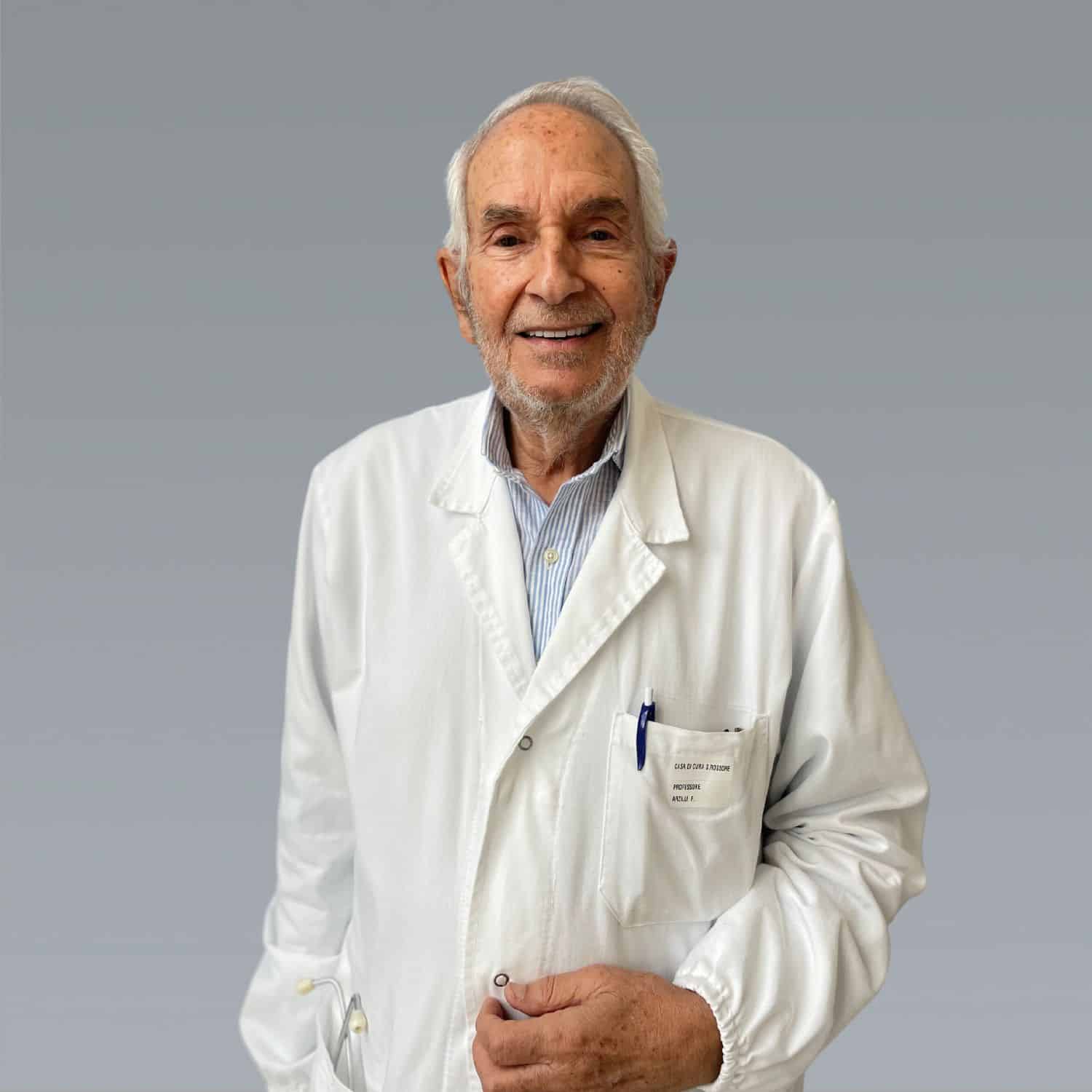Diabetology
Diabetes is a widespread disease with a high mortality rate from direct and secondary causes. It is a chronic condition due to a defect in the function or production of insulin, a hormone produced in the pancreas that is intended to promote/permit the utilization of glucose for energy processes.
Two forms of diabetes are commonly distinguished: type 1 diabetes and type 2 diabetes.
Diabetology, that is, the study of diabetic disease and the practice of its treatment, is a branch of endocrinology. At the Casa di Cura San Rossore, you can refer to endocrinology specialists who are experts in the field for both diagnosis and treatment of diabetes, as well as for dietary counseling, nutritional rehabilitation, and physical activity programs. Monitoring and complete management of the disease and its complications (e.g., ophthalmic, vascular, cardiology, etc.) is possible in our facility.
Performance and therapy
It affects about 10% of people with diabetes (300000 in Italy), arises most often in youth, is due to reduced insulin production in the pancreas, and is therefore commonly referred to as insulin-dependent diabetes. The direct cause is unknown, but immunological factors supported by genetic and probably environmental factors are in play.
There is a rarer form of diabetes, with onset in adulthood, called LADA diabetes (acronym from English: Latent Autoimmune Diabetes in Adults) characterized by a deficit in insulin production. 6-10% of individuals initially defined as type 2 are actually suffering from this form of autoimmune diabetes with slow progression to insulin dependence, which according to several authors represents a form of adult type 1 diabetes.
It is the most prevalent form and affects about 90 percent of diabetes cases, in Italy about 3 million people and 5.5 percent of the general population; type 2 diabetes most often arises in adulthood/advanced age, which is why it is also commonly known as “maturity” diabetes (although there are rare forms with juvenile onset, referred to as MODY – Maturity Onset Diabetes of the Young). In type 2 diabetes, there is no defect in insulin production by pancreatic beta-cells (whose activity, moreover, may become insufficient over time), but at the origin of this type of diabetes is a defect in insulin utilization by the body’s cells. The cause most likely lies in the interplay of predisposing genetic factors and environmental factors, which are often decisive in the onset and maintenance of the disease over time. Among environmental factors, poor exercise and excess body weight, especially with increased abdominal adiposity, are mainly at play; overweight and obesity are associated with type 2 diabetes in nearly 80% of patients, and in many cases weight loss alone allows regression of the disease.
It is a special form of diabetes, to be remembered for its clinical importance, which occurs in women who have elevated glucose levels for the first time during the period of pregnancy. It is a condition that affects about 4 percent of pregnancies and is probably related to impaired insulin function, which is hindered in its activity by that of other hormonal substances produced by the placenta; in fact, this form of diabetes, in a good percentage of cases regresses after delivery, but during pregnancy it requires careful monitoring, specific dietary treatment and often drug therapy.
For information contact number +39 050 586217 or send email to: info@sanrossorecura.it”
The symptoms and course can vary greatly, depending on the type of diabetes.
Type 1 may have an acute onset (e.g., in conjunction with an infectious or febrile episode), and the symptomatology, which may raise suspicion of diabetes at an early stage of the disease, is characterized by fatigue- asthenia, excessive thirst-polydipsia, high urine output-polyuria, to weight loss).
Type 2, on the other hand, has a very slow course, can remain silent even for years, and the direct symptoms (similar to those of type 1) being very nuanced and late, so that in many cases the first clinical symptoms are related more to the complications than to the disease itself.
Complications of diabetes can affect various organs and systems, and are mainly caused by damage to small and large arteries resulting from maintaining high blood glucose levels over time. Therefore, complications most often involve type 1 diabetes, manifesting dehydration, cardiac and blood changes, and even ketoacidotic coma.
In type 2 diabetes, acute complications are rather rare, while chronic complications of varying severity are very frequent, which can affect the eyes (with retinopathy and progressive reduction of vision up to blindness), kidneys (with renal failure up to the need for dialysis), cardiovascular system (with ischemia heart attack and heart failure, causes of 50% of diabetes-related deaths), lower limbs, feet (with ischemic damage, pain and ulceration to the point of needing amputations), central nervous system (by vascular damage with ischemia and stroke) and peripheral nervous system (with pain and sensitivity disorders), genital system (to erectile deficits in the male).
PRENATAL DIAGNOSIS
Prenatal diagnosis is a valuable tool for identifying diseases affecting the fetus before birth. It is a set of clinical examinations, instrumental and laboratory techniques aimed at identifying possible prenatal pathologies.
The Casa di Cura San Rossore, in collaboration with Ames, one of the most excellent Medical Genetics laboratories that provides tests and services for genetic diagnosis through upgrading with next-generation methodologies, has activated a Prenatal Pathway with Fetal DNA Testing, commonly referred to as NIPT TEST.
Casa di Cura San Rossore relies on the professionalism and expertise of Dr. Simona Rossi, Genetic Biologist, who accompanies patients through this Prenatal Pathway, concluding with the delivery and related explanation of the Nipt Test.
What we are proposing is a Fetal DNA screening test to be performed with a simple blood draw to the pregnant woman from the 11th week of pregnancy and with results expected within 10 days with a medical report of the highest quality.
The test, in addition to the classic aneuploidies of chromosomes 21, 18, 13, X and Y, can detect unbalanced structural rearrangements of all chromosomes, such as duplications or deletions of certain DNA regions, with a resolution of 5-7 Mb (megabases).
In addition, it is possible to analyze some of the most common microdeletions (Di George syndrome, Cri.du.chat syndrome, Prader-Willi/Angelman syndrome, 1p36 deletion syndrome, Wolf-Hirschorn syndrome, Jacobsen syndrome, Langer-Giediom syndrome, Smith-Magenis syndrome, Cognitive Brachydactyly-defic syndrome) with a resolution > or equal to 5-7 Megabases.
This test can also take on diagnostic value in the case of Mendelian diseases.
You can request information at percorsodiagnosiprenatale@sanrossorecura.it to which Dr. Simona Rossi will respond.
As a result of the above, apart from type 1 disease in which there is an acute onset, the presence of diabetes, especially type 2, in a large proportion of cases is detected many years after the onset of the disease, either by chance (e.g., during surgery) or by laboratory tests. Only an indicative index can be the value of fasting blood glucose, but for diagnosis there are precise criteria set internationally, based on certain values, repeated over time, of fasting blood glucose or based on certain changes in blood glucose over 3 hours after sugar intake (the test that is used is the glucose load curve (Oral Glucose Tolerance Test- OGTT), usually with intake of 75 g of glucose.
Laboratory tests useful for diagnosis are plasma C-peptide assay (basal or after stimulation with glucagon), which is a marker of beta-cell function, and the search for specific antibodies that are markers of autoimmunity (ICA, IA-2, IM, GADA).
In addition to the diagnostic criteria for diabetes proper, it should also be mentioned that there are criteria indicative of other alterations in sugar metabolism These alterations, commonly referred to as “pre-diabetes,” diagnosed by OGTT, are Impaired Fasting Glucose (in English Impaired Fasting Glucose-IFG) and Impaired Glucose Tolerance (in English Impaired Glucose Tolerance-IGT): do not represent a disease situation but indicate an elevated risk of developing diabetic disease, an increased risk of cardiovascular events, and are often associated with other issues such as dyslipidemia, overweight, and obesity.
Once the disease is established, the importance of preventing and slowing down the progression of damage by carefully monitoring the metabolic picture and also the possible impact of other possible concausal factors (such as blood pressure values, body weight, and abdominal fat) is evident. Of particular importance is the periodic monitoring of laboratory tests, which should include, along with blood glucose, CBC and urine test, glycated hemoglobin – HbA1c, which is the most indicative marker of blood glucose trends over time, indices of kidney and liver function, cholesterol (total, HDL and LDL) and triglycerides. In addition, even in the absence of symptoms, the appropriate specialized checks of the target organs are necessary, with the appropriate periodic diagnostic instrumental investigations.
For information contact number +39 050 586217 or send e-mail to info@sanrossorecura.it
Diabetology, i.e., the study of diabetic disease and the practice of its treatment, is a branch of endocrinology, which has become increasingly defined and specialized over time. At the Casa di Cura San Rossore referrals can be made to endocrinology specialists with expertise in the field for both diagnosis and treatment of diabetes, as well as dietary counseling, nutritional rehabilitation, and physical activity programs. Thanks to the collaboration with the medical specialists of the various branches involved, the analytical laboratory and the diagnostic instrumental services of the Treatment Center, in our Facility it is possible to monitor and fully manage the disease and its complications (e.g., ophthalmological, vascular, cardiological, etc.) to provide the best treatment of the patient’s clinical problems. The Casa di Cura San Rossore provides appropriate services.
For information contact number +39 050 586217 or send email to: info@sanrossorecura.it


